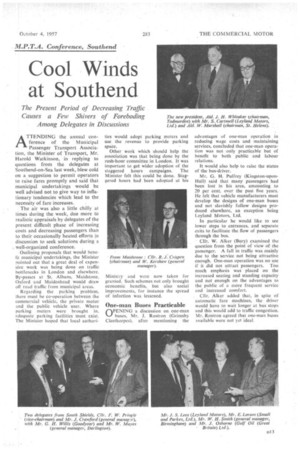Cool Winds at Southend
Page 55

If you've noticed an error in this article please click here to report it so we can fix it.
The Present Period of Decreasing Traffic Causes a Few Shivers of Foreboding Among Delegates in Discussions
TTENDINCi the annual con ference of the Municipal
Passenger Transport Association, the Minister of Transport, Mr. Harold Watkinson, in replying to questions from the delegates at Southend-on-Sea last week, blew cold on a suggestion to permit operators to raise fares promptly and said that municipal undertakings would be well advised not to give way to inflationary tendencies which lead to the
necessity of fare increases. .
The air was also a little chilly at times during the week, due more to realistic appraisals by delegates of the present difficult phase of increasing costs and decreasing passengers than to their occasionally heated efforts in discussion to seek solutions during a well-organized conference. .
Outlining proposals that would benefit municipal undertakings, the Minister pointed out that a great deal of expensive work was being done on traffic bottlenecks in London and elsewhere. By-passes at St. Albans, Maidstone, Oxford and Maidenhead would draw off road traffic from municipal areas.
Regarding the parking problem, there must. be co-operation between the commercial vehicle, the private motor and the public vehicle user. Where parking meters were brought in adequate parking facilities must exist. The Minister hoped that local auffiori
ties would adopt parking meters and use the revenue to provide parking space.
Other work which should help the association was that being done by the rush-hour committee in London. It was important to get wider adoption of the staggered hours campaigns. The Minister felt this could be done. Staggered hours had been adopted at his Ministry and were now taken for granted. Such schemes not only brought economic benefits, but also social improvements, for instance the spread of infection was lessened.
One-man Buses Practicable
QPENING a discussion on one-man buses, Mr. J. Rostron (Grimsby Cleethorpes). after mentioning the
advantages of one-man operation in reducing wage costs and maintaining services, concluded that one-man operation was not only practicable but of benefit to both public and labour relations.
It would also help to raise the status of the bus-driver.
Mr. G. H. Pulfrey (Kingston-uponHull) said that many passengers had been lost in his area, amounting to 20 per cent, over the past five years, He felt that vehicle manufacturers must develop the designs of one-man buses and not slavishly follow designs produced elsewhere, an exception being Leyland Motors, Ltd.
In particular he would like to see lower steps to entrances, and separate exits to facilitate the flow of passengers through the bus.
Cilr. W. Alker (Bury) examined the question from the point of view of the passenger. A fall in traffic was mainly due to the service not being attractive enough. One-man operation was no use if it did not attract passengers. Too much emphasis was placed on the increased seating and standing capacity and not enough on the advantages to the public of a more frequent service and increased comfort Cllr. Alker added that, in spite of automatic fare machines, the driver would have to wait longer at bus stops and this would add to traffic congestion. Mr. Rostron agreed that one-man buses available were not yet ideal.




















































































































